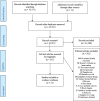Examining the mental health outcomes of school-based peer-led interventions on young people: A scoping review of range and a systematic review of effectiveness
- PMID: 33857174
- PMCID: PMC8049263
- DOI: 10.1371/journal.pone.0249553
Examining the mental health outcomes of school-based peer-led interventions on young people: A scoping review of range and a systematic review of effectiveness
Abstract
Schools worldwide have implemented many different peer-led interventions with mixed results, but the evidence base on their effectiveness as mental health interventions remains limited. This study combines a scoping review and systematic review to map the variations of peer-led interventions in schools and to evaluate the quality of the existing evidence base. This scoping review and systematic review evaluated the existing literature across 11 academic databases. Studies were included if they reported a peer-led intervention that aimed to address a mental health or wellbeing issue using a peer from the same school setting. Data were extracted from published and unpublished reports and presented as a narrative synthesis. 54 studies met eligibility criteria for the scoping review, showing that peer-led interventions have been used to address a range of mental health and wellbeing issues globally. 11 studies met eligibility criteria for the systematic review with a total of 2,239 participants eligible for analysis (929 peer leaders; 1,310 peer recipients). Two studies out of seven that looked at peer leaders showed significant improvements in self-esteem and social stress, with one study showing an increase in guilt. Two studies out of five that looked at peer recipient outcomes showed significant improvements in self-confidence and in a quality of life measure, with one study showing an increase in learning stress and a decrease in overall mental health scores. The findings from these reviews show that despite widespread use of peer-led interventions, the evidence base for mental health outcomes is sparse. There appear to be better documented benefits of participation for those who are chosen and trained to be a peer leader, than for recipients. However, the small number of included studies means any conclusions about effectiveness are tentative.
Conflict of interest statement
The authors have declared that no competing interests exist.
Figures



Similar articles
-
Recovery schools for improving behavioral and academic outcomes among students in recovery from substance use disorders: a systematic review.Campbell Syst Rev. 2018 Oct 4;14(1):1-86. doi: 10.4073/csr.2018.9. eCollection 2018. Campbell Syst Rev. 2018. PMID: 37131375 Free PMC article.
-
Examining the mental health outcomes of peer-led school-based interventions on young people aged between 4 and 18 years old: a systematic review protocol.Syst Rev. 2019 Apr 26;8(1):104. doi: 10.1186/s13643-019-1027-3. Syst Rev. 2019. PMID: 31027512 Free PMC article.
-
School-based interventions for reducing disciplinary school exclusion: a systematic review.Campbell Syst Rev. 2018 Jan 9;14(1):i-216. doi: 10.4073/csr.2018.1. eCollection 2018. Campbell Syst Rev. 2018. PMID: 37131379 Free PMC article.
-
Impact of summer programmes on the outcomes of disadvantaged or 'at risk' young people: A systematic review.Campbell Syst Rev. 2024 Jun 13;20(2):e1406. doi: 10.1002/cl2.1406. eCollection 2024 Jun. Campbell Syst Rev. 2024. PMID: 38873396 Free PMC article. Review.
-
Service design for children and young people with common mental health problems: literature review, service mapping and collective case study.Health Soc Care Deliv Res. 2024 May;12(13):1-181. doi: 10.3310/DKRT6293. Health Soc Care Deliv Res. 2024. PMID: 38767587 Review.
Cited by
-
Investigating the Role of Friendship Interventions on the Mental Health Outcomes of Adolescents: A Scoping Review of Range and a Systematic Review of Effectiveness.Int J Environ Res Public Health. 2023 Jan 25;20(3):2160. doi: 10.3390/ijerph20032160. Int J Environ Res Public Health. 2023. PMID: 36767526 Free PMC article.
-
Development of a Peer Support Mobile App and Web-Based Lesson for Adolescent Mental Health (Mind Your Mate): User-Centered Design Approach.JMIR Form Res. 2022 May 27;6(5):e36068. doi: 10.2196/36068. JMIR Form Res. 2022. PMID: 35622401 Free PMC article.
-
Online peer support training to promote adolescents' emotional support skills, mental health and agency during COVID-19: Randomised controlled trial and qualitative evaluation.Eur Child Adolesc Psychiatry. 2023 Jun;32(6):1119-1130. doi: 10.1007/s00787-021-01933-0. Epub 2022 Feb 17. Eur Child Adolesc Psychiatry. 2023. PMID: 35174419 Free PMC article. Clinical Trial.
-
"A PhD is just going to somehow break you": A qualitative study exploring the role of peer support for doctoral students.PLoS One. 2025 Jun 9;20(6):e0325726. doi: 10.1371/journal.pone.0325726. eCollection 2025. PLoS One. 2025. PMID: 40489484 Free PMC article.
-
A Systematic Review of School-Based Suicide Prevention Interventions for Adolescents, and Intervention and Contextual Factors in Prevention.Prev Sci. 2023 Feb;24(2):365-381. doi: 10.1007/s11121-022-01449-2. Epub 2022 Oct 27. Prev Sci. 2023. PMID: 36301381
References
-
- NHS Digital. Mental Health of Children and Young People in England, 2017. Summary of key findings. Department of Health and Social Care. London, 2018.
-
- Houlston C, Smith PK, Jessel J. Investigating the Extent and Use of Peer Support Initiatives in English Schools. Educ Psychol. 2009;29(3):325–44. EJ864958.
Publication types
MeSH terms
LinkOut - more resources
Full Text Sources
Other Literature Sources
Miscellaneous

